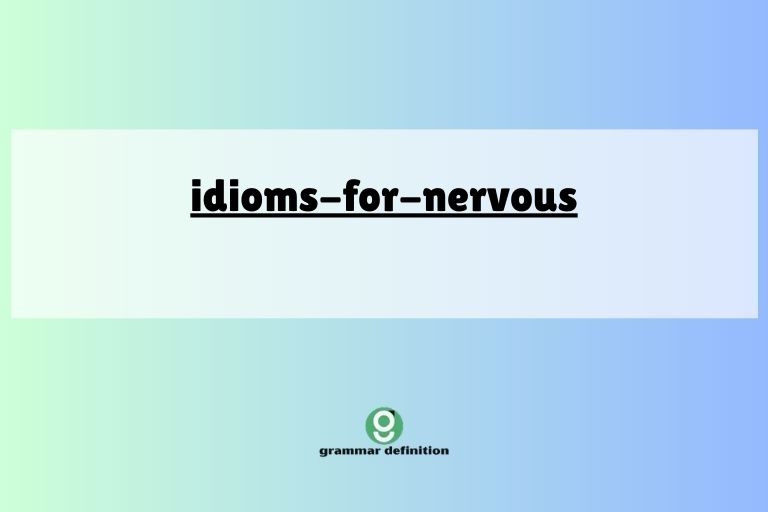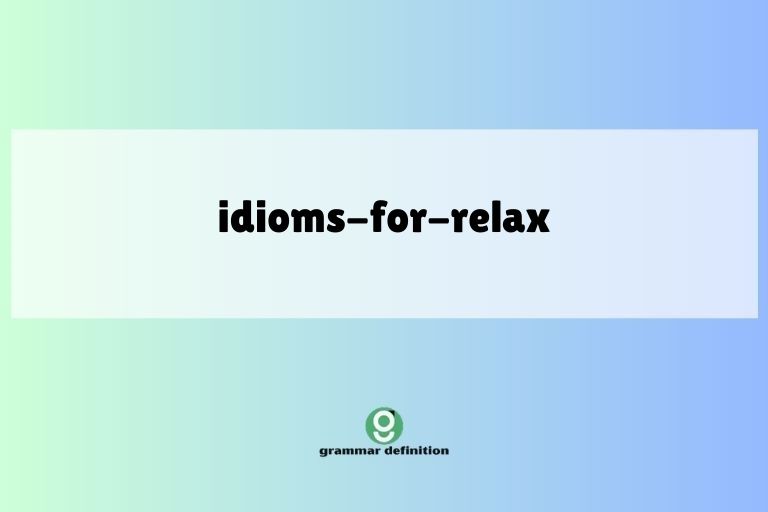Idioms for Nervous: Mastering Expressive English

Understanding idioms is crucial for mastering English, especially when conveying nuanced emotions. Nervousness, a common human experience, is often best expressed through vivid and relatable idioms.
This article delves into a comprehensive collection of idioms used to describe nervousness, exploring their meanings, origins, and proper usage. Whether you’re an ESL learner, a student preparing for an exam, or simply someone looking to enrich their vocabulary, this guide will equip you with the tools to articulate feelings of anxiety with greater precision and flair.
By mastering these idioms, you’ll not only enhance your comprehension of spoken and written English but also gain the ability to express yourself more effectively and engagingly. We’ll cover everything from common idioms to more obscure expressions, providing numerous examples and practice exercises to solidify your understanding.
Let’s embark on this journey to unlock the expressive power of idioms for nervousness!
Table of Contents
- Definition of Idioms for Nervousness
- Structural Breakdown of Idioms
- Types and Categories of Nervousness Idioms
- Examples of Idioms for Nervousness
- Usage Rules for Nervousness Idioms
- Common Mistakes When Using Nervousness Idioms
- Practice Exercises
- Advanced Topics: Nuances and Regional Variations
- Frequently Asked Questions
- Conclusion
Definition of Idioms for Nervousness
An idiom is a phrase or expression whose meaning cannot be understood from the ordinary meanings of the words it contains. It is a figurative language device that adds color and depth to communication.
Idioms related to nervousness specifically describe states of anxiety, apprehension, or unease. These idioms often draw on metaphors and similes to create vivid imagery and convey the intensity of the feeling.
Classification: Idioms can be classified based on their grammatical structure (e.g., phrasal verbs, prepositional phrases) or their metaphorical basis (e.g., idioms related to physical sensations, animal behavior). Nervousness idioms often fall into the category of metaphorical expressions, where the feeling is likened to something tangible or relatable.
Function: The primary function of idioms is to enhance communication by providing a concise and evocative way to express complex emotions. In the context of nervousness, idioms allow speakers and writers to convey subtle shades of anxiety that might be difficult to articulate using literal language alone.
Contexts: Idioms for nervousness are used in a wide range of contexts, from casual conversations to formal writing. They are particularly common in literature, film, and everyday speech, where they add authenticity and emotional depth to the narrative.
Structural Breakdown of Idioms
Idioms, while seemingly simple, often have a complex underlying structure. Understanding this structure can aid in comprehension and usage.
The structural elements vary depending on the specific idiom, but some common patterns emerge.
Phrasal Verbs: Many idioms involving nervousness incorporate phrasal verbs (verb + preposition/adverb). The combination creates a meaning distinct from the individual words. For example, “to sweat it out” combines the verb “sweat” with the adverb “out” to mean enduring a period of anxiety.
Prepositional Phrases: Other idioms utilize prepositional phrases to convey nervousness. These phrases often describe the state of being “on edge” or “in a state of agitation.”
Similes and Metaphors: Similes (using “like” or “as”) and metaphors directly compare nervousness to other concepts. For instance, “like a cat on a hot tin roof” uses a simile to describe extreme restlessness and anxiety. Metaphors, on the other hand, imply a comparison without using “like” or “as,” such as “butterflies in my stomach.”
Fixed Expressions: Some idioms are fixed expressions, meaning their wording cannot be altered without losing their idiomatic meaning. These expressions must be learned and used as a whole unit.
Types and Categories of Nervousness Idioms
Idioms for nervousness can be categorized based on the specific aspect of anxiety they describe or the imagery they evoke. Here are some common categories:
Physical Manifestations of Nervousness
These idioms describe the physical sensations associated with anxiety, such as sweating, trembling, or an upset stomach.
Mental State of Nervousness
These idioms focus on the mental aspects of nervousness, such as worry, apprehension, or a lack of focus.
Behavioral Expressions of Nervousness
These idioms describe how people behave when they are nervous, such as fidgeting, pacing, or avoiding eye contact.
Intensity of Nervousness
These idioms indicate the degree or severity of nervousness, ranging from mild unease to extreme anxiety.
Specific Situations Causing Nervousness
These idioms are often used in the context of particular situations that commonly induce anxiety, such as public speaking or taking exams.
Examples of Idioms for Nervousness
To illustrate the diverse range of idioms for nervousness, let’s explore examples organized by the categories discussed above. Each example will include the idiom, its meaning, and a sentence demonstrating its usage.
Table 1: Physical Manifestations of Nervousness
The table below illustrates idioms that describe the physical symptoms of nervousness. These idioms often refer to physical sensations like sweating, shaking, or stomach discomfort.
| Idiom | Meaning | Example Sentence |
|---|---|---|
| To have butterflies in one’s stomach | To feel nervous or anxious, especially before an event | I had butterflies in my stomach before my presentation. |
| To sweat bullets | To be extremely nervous or anxious | He was sweating bullets waiting for the exam results. |
| To have cold feet | To become nervous or afraid, especially before a big event like a wedding | He almost got cold feet before walking down the aisle. |
| To shake like a leaf | To tremble uncontrollably due to fear or nervousness | She was shaking like a leaf when she heard the sudden noise. |
| To be on pins and needles | To be very anxious or excited while waiting for something | I was on pins and needles waiting for the phone to ring. |
| To get the jitters | To become nervous or uneasy | He always gets the jitters before a big game. |
| To be a bundle of nerves | To be extremely nervous and tense | She was a bundle of nerves on her first day of work. |
| To feel one’s heart race | To experience a rapid heartbeat due to nervousness | I could feel my heart race as I walked on stage. |
| To tremble with fear | To shake slightly and uncontrollably due to fear | He began to tremble with fear when he saw the dark figure. |
| To have a knot in one’s stomach | To feel anxious or uneasy | I had a knot in my stomach all morning before the meeting. |
| To feel faint | To feel weak and dizzy, often due to nervousness | She started to feel faint when she heard the news. |
| To get goosebumps | To develop small bumps on the skin due to fear or excitement | I got goosebumps when I heard the scary story. |
| To feel clammy | To have slightly wet and cold skin due to nervousness | His hands felt clammy as he waited for his turn. |
| To have a lump in one’s throat | To feel a tightness in the throat due to emotion or nervousness | She had a lump in her throat as she said goodbye. |
| To bite one’s nails | To nervously chew on one’s fingernails | He started to bite his nails when he felt anxious. |
| To fidget | To make small movements, especially of the hands and feet, due to nervousness | He couldn’t stop fidgeting during the long meeting. |
| To pace back and forth | To walk repeatedly in one direction and then the opposite direction due to nervousness | She was pacing back and forth waiting for the call. |
| To tap one’s foot | To rhythmically move one’s foot up and down due to nervousness | He started to tap his foot impatiently. |
| To play with one’s hair | To nervously touch or twist one’s hair | She nervously played with her hair during the interview. |
| To perspire heavily | To sweat a lot because of nervousness | He began to perspire heavily as he gave his speech. |
| To have a dry mouth | To experience a lack of saliva due to nervousness | She had a dry mouth before going on stage. |
Table 2: Mental State of Nervousness
This table focuses on idioms that describe the mental aspects of nervousness, such as worry, anxiety, and apprehension. These idioms often refer to feelings of unease, fear, and mental agitation.
| Idiom | Meaning | Example Sentence |
|---|---|---|
| To be on edge | To be nervous and irritable | She’s been on edge all day waiting for the results. |
| To be in a state of agitation | To be visibly anxious or disturbed | He was in a state of agitation after the accident. |
| To be worried sick | To be extremely worried | She was worried sick about her son’s health. |
| To be beside oneself with worry | To be overwhelmed with worry | They were beside themselves with worry when their daughter didn’t come home. |
| To be on tenterhooks | To be in a state of suspense or agitation because of uncertainty | We were on tenterhooks waiting for the judge’s decision. |
| To be apprehensive about | To feel anxious or fearful about something that might happen | I’m apprehensive about the upcoming exam. |
| To have one’s heart in one’s mouth | To be very frightened or nervous | My heart was in my mouth when the car skidded. |
| To be scared stiff | To be extremely frightened | She was scared stiff when she heard the loud bang. |
| To be paralyzed with fear | To be so afraid that one is unable to move or act | He was paralyzed with fear when he saw the snake. |
| To be in a cold sweat | To be very nervous or frightened | I woke up in a cold sweat after having a nightmare. |
| To lose one’s nerve | To become too frightened to do something | He lost his nerve and backed out of the competition. |
| To be at one’s wit’s end | To be so worried and stressed that one does not know what to do next | She was at her wit’s end trying to solve the problem. |
| To be petrified of | To be extremely afraid of something | He is petrified of spiders. |
| To be filled with trepidation | To feel fear or anxiety about something that is going to happen | She was filled with trepidation as she walked into the interview. |
| To have a sinking feeling | To feel that something bad is going to happen | I had a sinking feeling when I saw the police car. |
| To be on pins | To be in a state of nervous excitement or anxiety | We were all on pins waiting for the announcement. |
| To be in a funk | To be in a state of depression or low spirits | He’s been in a funk ever since he lost his job. |
| To be on a knife-edge | To be in a tense or uncertain situation | The negotiations were on a knife-edge. |
| To have a nervous breakdown | To suffer a period of mental illness resulting from severe stress or anxiety | She had a nervous breakdown after working too hard. |
| To be stressed out | To be feeling overwhelmed or unable to cope with mental or emotional pressure | I’m completely stressed out with all this work. |
| To be tearing one’s hair out | To be extremely worried or frustrated | I was tearing my hair out trying to fix the computer. |
Table 3: Behavioral Expressions of Nervousness
This table includes idioms that describe how people behave when they are nervous. These idioms often refer to fidgeting, pacing, or avoiding eye contact.
| Idiom | Meaning | Example Sentence |
|---|---|---|
| To beat around the bush | To avoid talking directly about the main subject | Stop beating around the bush and tell me what happened. |
| To clam up | To become silent, usually because of nervousness | He clammed up when the police asked him questions. |
| To avoid eye contact | To deliberately not look someone in the eyes due to nervousness or guilt | He was avoiding eye contact because he was lying. |
| To stutter | To speak with difficulty because you are nervous | She started to stutter when she was called on to speak. |
| To mince words | To avoid saying something unpleasant or negative | Don’t mince words, just tell me the truth. |
| To get tongue-tied | To have difficulty speaking because of nervousness | I always get tongue-tied when I talk to her. |
| To bite one’s lip | To press one’s lips together nervously | She was biting her lip as she waited for the results. |
| To shift uncomfortably | To move slightly because of nervousness | He shifted uncomfortably in his seat during the lecture. |
| To clear one’s throat | To make a slight cough to get attention or out of nervousness | He cleared his throat before beginning his speech. |
| To wring one’s hands | To clasp and twist one’s hands together, expressing nervousness | She was wringing her hands with worry. |
| To sweat profusely | To sweat a great deal, often due to nervousness | He was sweating profusely during the interview. |
| To look pale | To appear with a lighter skin tone than usual, often due to nervousness | She looked pale when she heard the news. |
| To stammer | To speak with involuntary pauses or repetitions | He began to stammer when he was asked a difficult question. |
| To whisper | To speak very softly, often due to nervousness or secrecy | She whispered her answer to the teacher. |
| To look shifty | To appear dishonest or nervous | He looked shifty when he denied the accusations. |
| To avoid questions | To try not to answer questions, often due to nervousness or guilt | He was avoiding questions about his whereabouts. |
| To give evasive answers | To give answers that are not direct or clear | He gave evasive answers to the reporter’s questions. |
| To stumble over one’s words | To have difficulty speaking clearly | He began to stumble over his words when he got nervous. |
| To have a nervous laugh | To laugh in a strained or unnatural way because of nervousness | She gave a nervous laugh when she realized her mistake. |
| To seek reassurance | To ask for confirmation that everything is okay | He kept seeking reassurance from his friends. |
| To look around anxiously | To nervously survey one’s surroundings | She was looking around anxiously for her lost keys. |
Table 4: Intensity of Nervousness
This table showcases idioms that indicate the degree or severity of nervousness, ranging from mild unease to extreme anxiety.
| Idiom | Meaning | Example Sentence |
|---|---|---|
| To be a little nervous | To be slightly anxious | I’m a little nervous about the presentation. |
| To be quite anxious | To be moderately worried | She was quite anxious about the test results. |
| To be extremely nervous | To be very worried and uneasy | He was extremely nervous before the surgery. |
| To be scared out of one’s wits | To be extremely frightened | We were scared out of our wits when we heard the scream. |
| To be beside oneself | To be overwhelmed with emotion, often worry or anxiety | She was beside herself with grief after the loss. |
| To be on edge | To be tense, nervous, and irritable | He’s been on edge all day waiting for the news. |
| To be a nervous wreck | To be in a state of extreme nervousness | She was a nervous wreck before her wedding. |
| To be in a cold sweat | To be very nervous or frightened | He woke up in a cold sweat after the nightmare. |
| To be at the end of one’s rope | To have no strength or patience left | I’m at the end of my rope dealing with this problem. |
| To be really worked up | To be very excited, nervous, or angry | She was really worked up about the upcoming competition. |
| To be on pins and needles | To be very anxious or excited while waiting for something | We were on pins and needles waiting for the announcement. |
| To be keyed up | To be excited and tense | The team was keyed up before the big game. |
| To be uptight | To be tense and nervous | He was uptight about the job interview. |
| To be jittery | To be nervous and unable to relax | I felt jittery after drinking too much coffee. |
| To be on tenterhooks | To be in a state of suspense or agitation | We were on tenterhooks waiting for the verdict. |
| To be in a flap | To be in a state of panic or agitation | She was in a flap trying to get everything ready. |
| To be in a tizzy | To be in a state of nervous excitement or confusion | She was in a tizzy trying to find her keys. |
| To be beside oneself with worry | To be extremely worried | They were beside themselves with worry when their child went missing. |
| To be biting one’s nails to the quick | To be extremely nervous | He was biting his nails to the quick waiting for the call. |
| To be sweating buckets | To be sweating a lot due to nervousness | He was sweating buckets during the presentation. |
| To be as nervous as a long-tailed cat in a room full of rocking chairs | To be extremely nervous | He was as nervous as a long-tailed cat in a room full of rocking chairs giving his speech. |
Usage Rules for Nervousness Idioms
Using idioms correctly requires attention to detail and an understanding of their specific contexts. Here are some guidelines to ensure proper usage:
Context Matters: Consider the situation and audience when using idioms. Some idioms are more appropriate for informal settings, while others are suitable for formal communication.
Word Order: Idioms often have a fixed word order. Altering the order can change the meaning or make the expression sound unnatural.
Tense and Agreement: Ensure that the verb tense and subject-verb agreement within the idiom are correct. For example, “He has butterflies in his stomach” is correct, while “He have butterflies in his stomach” is incorrect.
Overuse: Avoid using too many idioms in a single conversation or piece of writing. Overuse can make your language sound unnatural or forced.
Understanding the Nuance: Each idiom carries a specific nuance. Make sure you understand the precise meaning and emotional tone of the idiom before using it.
Common Mistakes When Using Nervousness Idioms
Even advanced learners sometimes make mistakes when using idioms. Here are some common errors to avoid:
Literal Interpretation: Interpreting idioms literally is a common mistake. Remember that idioms have figurative meanings that differ from the literal meanings of their words.
Incorrect Word Choice: Substituting words within an idiom can alter its meaning or make it nonsensical. Stick to the established wording of the idiom.
Misunderstanding the Context: Using an idiom in an inappropriate context can create confusion or miscommunication. Choose idioms that align with the situation and audience.
Grammatical Errors: Failing to use correct grammar within an idiom can detract from its impact. Pay attention to verb tense, subject-verb agreement, and other grammatical rules.
Mixing Idioms: Combining parts of different idioms can result in a confusing and incorrect expression. Avoid mixing idioms together.
Table 5: Correct vs. Incorrect Usage
The table below provides examples of correct and incorrect usage of idioms for nervousness, highlighting common mistakes and how to avoid them.
| Incorrect | Correct | Explanation |
|---|---|---|
| I have butterfly in my stomach. | I have butterflies in my stomach. | The idiom requires the plural form “butterflies.” |
| He sweated a bullet. | He sweated bullets. | The idiom requires the plural form “bullets.” |
| She is on the edge. | She is on edge. | The correct idiom is “on edge” without the article “the.” |
| They are worry sick. | They are worried sick. | The correct form is “worried,” not “worry.” |
| He was shake like a leaf. | He was shaking like a leaf. | The correct form is “shaking,” not “shake.” |
| I am in tenterhook. | I am on tenterhooks. | The correct idiom is “on tenterhooks,” not “in tenterhook.” It also requires the plural form. |
| He got cold foot. | He got cold feet. | The idiom requires the plural form “feet.” |
| She has a knot in her stomachs. | She has a knot in her stomach. | The correct idiom uses the singular form “stomach.” |
Practice Exercises
To solidify your understanding of idioms for nervousness, complete the following exercises. Choose the correct idiom to fill in each blank.
Exercise 1: Multiple Choice
Choose the correct idiom from the options provided to complete each sentence. This exercise focuses on understanding the meaning of each idiom in context.
| Question | Options | Answer |
|---|---|---|
| Before the big game, he always _____. | a) has butterflies in his stomach b) sweats water c) feels fine | a) has butterflies in his stomach |
| She was _____ waiting for the exam results. | a) cool as a cucumber b) on pins and needles c) calm and collected | b) on pins and needles |
| He _____ when he saw the spider. | a) laughed heartily b) became brave c) froze with fear | c) froze with fear |
| She _____ before her presentation. | a) felt relaxed b) got the jitters c) was completely calm | b) got the jitters |
| He started to _____ when he was asked about the missing money. | a) sing a song b) clam up c) tell jokes | b) clam up |
| After the accident, she was _____. | a) in a state of agitation b) completely unbothered c) perfectly serene | a) in a state of agitation |
| He was _____ about the upcoming surgery. | a) excited b) apprehensive c) indifferent | b) apprehensive |
| She was _____ when her child didn’t come home on time. | a) carefree b) beside herself with worry c) totally relaxed | b) beside herself with worry |
| He _____ and backed out of the race. | a) gained confidence b) lost his nerve c) felt very brave | b) lost his nerve |
| I woke up _____ after having that nightmare. | a) refreshed b) in a cold sweat c) feeling great | b) in a cold sweat |
Exercise 2: Fill in the Blanks
Complete the following sentences using the appropriate idiom from the list below. This exercise tests your ability to recall and apply the idioms in context.
Idiom List: on edge, a bundle of nerves, shaking like a leaf, butterflies in my stomach, at my wit’s end
| Question | Answer |
|---|---|
| I’m _____ trying to fix this problem; I don’t know what to do anymore. | at my wit’s end |
| She’s been _____ all day waiting for the phone to ring. | on edge |
| Before the audition, I had _____. | butterflies in my stomach |
| He was _____ before his first skydiving experience. | a bundle of nerves |
| She was _____ when she heard the unexpected news. | shaking like a leaf |
Advanced Topics: Nuances and Regional Variations
For advanced learners, understanding the nuances and regional variations of idioms can further enhance their language proficiency. Some idioms may have subtle differences in meaning depending on the context or the speaker’s background.
Regional Variations: While many idioms are widely understood, some may be more common in certain regions or dialects. For example, an idiom used in British English may not be as familiar to speakers of American English.
Historical Context: Understanding the historical origins of idioms can provide deeper insight into their meanings and usage. Many idioms have roots in historical events, cultural practices, or literary works.
Subtle Differences in Meaning: Even seemingly similar idioms can have subtle differences in meaning or connotation. Pay attention to the specific emotional tone and context in which each idiom is used.
Frequently Asked Questions
Here are some frequently asked questions about idioms for nervousness:
- What is the best way to learn idioms?
The best way to learn idioms is through consistent exposure and active practice. Read widely, listen to native speakers, and try to incorporate idioms into your own speech and writing. Use flashcards, online resources, and language learning apps to reinforce your knowledge. Pay attention to the context in which idioms are used and try to understand their nuances.
- Are idioms the same in all English-speaking countries?
No, idioms can vary significantly between different English-speaking countries and regions. While some idioms are widely understood, others may be specific to a particular area. Be aware of these regional variations and adapt your language accordingly.
- How can I avoid misusing idioms?
To avoid misusing idioms, pay close attention to their specific wording, context, and meaning. Double-check your understanding of an idiom before using it, and be mindful of your audience. If you’re unsure about an idiom, it’s best to avoid using it altogether.
- Is it okay to use idioms in formal writing?
The appropriateness of using idioms in formal writing depends on the specific context and purpose of the writing. In general, it’s best to avoid using overly casual or colloquial idioms in formal settings. However, well-chosen idioms can add color and depth to your writing, even in formal contexts.
- How important is it to know idioms for understanding native speakers?
Knowing idioms is crucial for understanding native speakers, as idioms are a common feature of everyday speech. Without a good understanding of idioms, you may miss the intended meaning of what someone is saying and struggle to follow conversations.
- Can I translate idioms directly from my native language?
No, you cannot usually translate idioms directly from your native language, as idioms are often culturally specific and do not have direct equivalents in other languages. Attempting to translate idioms literally can result in nonsensical or incorrect expressions.
- How can I practice using idioms in conversation?
Practice using idioms in conversation by actively listening to native speakers and noting the idioms they use. Try to incorporate these idioms into your own speech, and don’t be afraid to ask for clarification if you’re unsure about their meaning or usage. You can also practice with a language partner or tutor.
- What are some resources for learning more idioms?
There are many resources available for learning more idioms, including online dictionaries, idiom websites, language learning apps, and textbooks. Look for resources that provide clear definitions, example sentences, and audio pronunciations. You can also find idioms in literature, movies, and TV shows.
Conclusion
Mastering idioms for nervousness is an invaluable step in achieving fluency and expressiveness in English. By understanding the nuances, structural elements, and proper usage of these idioms, you can effectively communicate feelings of anxiety and apprehension with greater precision and flair.
Remember to pay attention to context, word order, and grammatical accuracy when using idioms, and avoid common mistakes such as literal interpretation and incorrect word choice.
Continue to expand your knowledge of idioms through consistent exposure and active practice. Read widely, listen to native speakers, and incorporate idioms into your own speech and writing.
With dedication and effort, you can unlock the expressive power of idioms and elevate your English language skills to new heights. Embrace the challenge, and enjoy the journey of mastering the colorful world of English idioms
.






